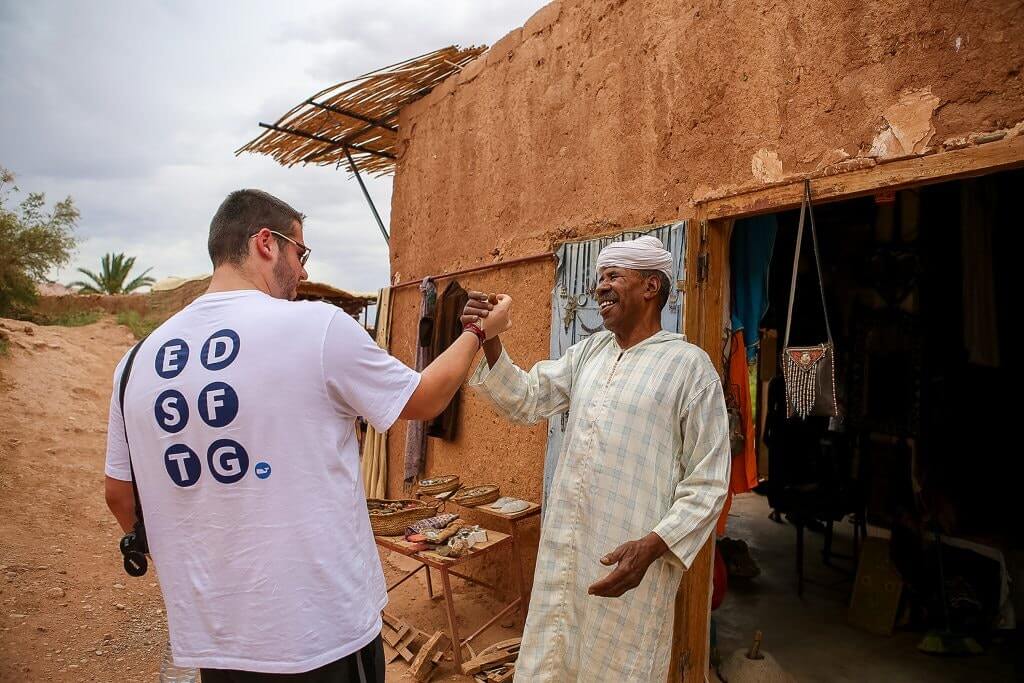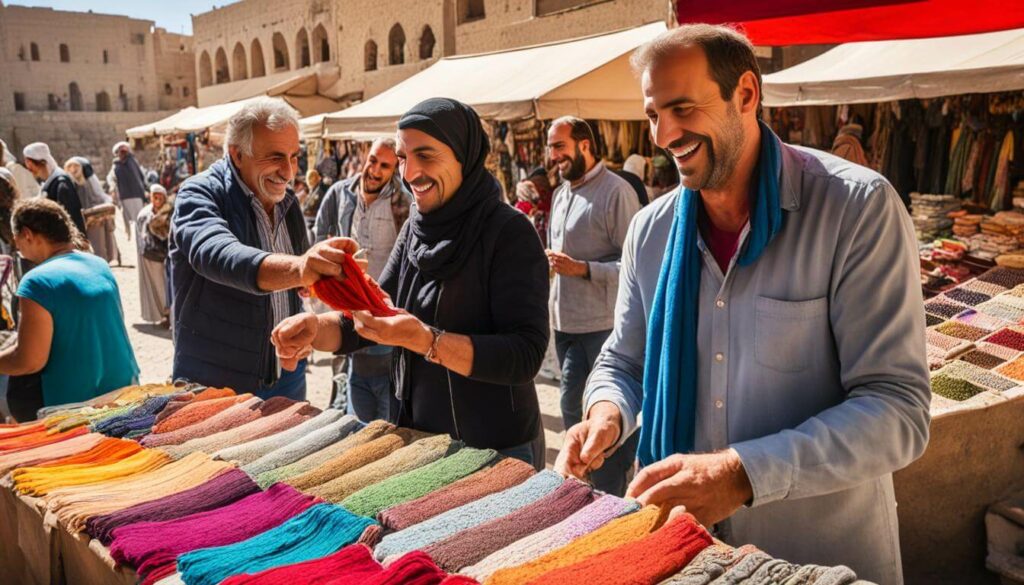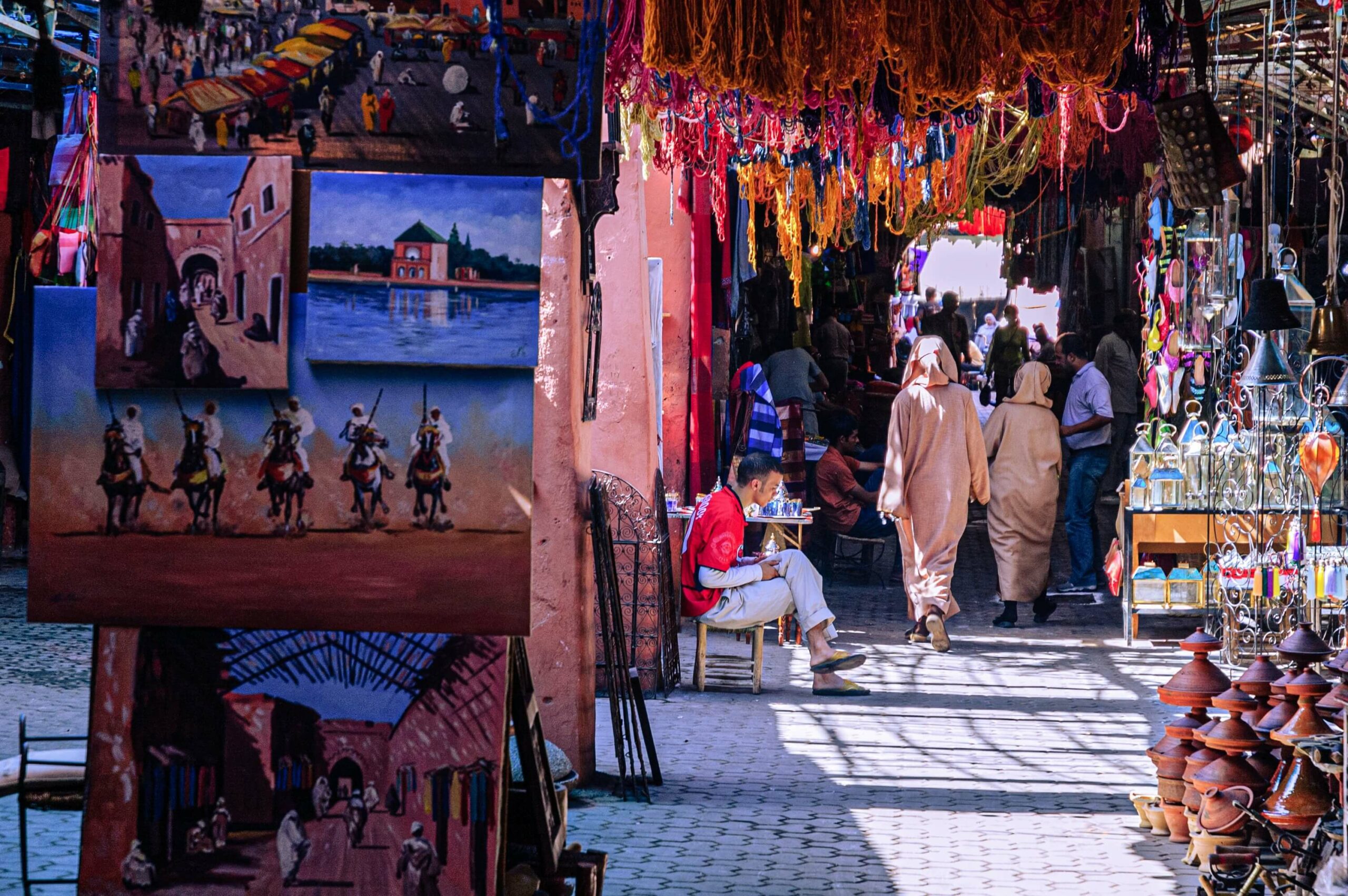Hey there, traveler. If you’re planning to visit Morocco, I highly recommend picking up a few Moroccan Arabic phrases – or Darija, as we call it. Trust me, it will make your experience so much more enjoyable, and it’s one of the best ways to truly connect with locals.
Moroccan Arabic is a unique blend of classical Arabic, Amazigh (Berber), French, and even a bit of Spanish. It’s pretty different from the standard Arabic you might have learned, but no worries, Moroccans will totally appreciate your effort to speak their language.
I’m here to share some simple but essential phrases that’ll help you greet people, ask for directions, or even haggle at the souks (markets). Whether you’re exploring Marrakech, Casablanca, or Fez, these Moroccan Arabic phrases will make it a whole lot easier to get around and connect with locals.
Fun fact: In some areas near Marrakech, people speak Amazigh (Berber), but don’t stress – they also speak Darija. The funny thing is, only us Moroccans can tell the difference between the accents. Don’t worry, you’re safe, and everyone will understand you, and they’ll love you for trying to speak their language.
Moroccan Arabic: Is it Easy to Learn?
Let me tell you, Moroccan Arabic (Darija) is actually easier to pick up than you might think. It’s got a mix of languages, but don’t worry, it’s not like you need to become fluent. You’ll notice some words, like ‘frigo’ (for fridge), come from French. But honestly, you don’t have to know it all. Just learning a few simple phrases will make a huge difference. And trust me, we Moroccans love it when visitors try speaking our language—even if it’s just the basics.
Why Learn Moroccan Arabic Phrases?
Trust me, speaking even a few words of Moroccan Arabic can completely change the way you experience Morocco. Moroccans are super friendly and welcoming, and honestly, tourists are easy to spot. But when you greet people or use simple Darija phrases, it’s like an instant icebreaker. It really makes you connect with them.
Plus, this little effort shows that you respect their culture, and Moroccans love sharing their traditions. You’ll notice how people will go out of their way to help—whether it’s a tip, a smile, or a kind gesture—just because you made the effort to speak their language.
Essential Moroccan Arabic Phrases for Tourists
As I mentioned earlier, greetings are the foundation of any conversation in Morocco, and knowing how to greet locals properly will help you build an instant connection.

Basic Moroccan Greetings
- Hello/Hi: This is the go-to greeting in Morocco. It’s polite, respectful, and used everywhere. It’s the perfect way to kick off a conversation with a warm and welcoming vibe.
- Response: When someone greets you with Assalamou Alaikum, this is the response you give. It’s a sign of mutual respect and keeps the conversation flowing nicely.
- Good Morning: Sbâh l-khir (Good morning)
Use this greeting in the morning—it’s a friendly, go-to way to say hello as you start the day and meet new people. - Good Evening: Masa l-khir (Good evening)
For when the sun is setting, this greeting is a warm way to wish someone well later in the day. It’s casual and reflects the time of day. - How are you?: Labas? (How’s everything?)
This is the typical way to ask how someone’s doing in Morocco. The standard reply is Labas, Choukran (I’m good, thank you). It’s easy, friendly, and gets the conversation started.
Polite Words in Moroccan Arabic
- Please: Afak
This is the go-to phrase when you want to make a request or be polite. For example, “Afak, bghit lma” means “Please, I want water.” It’s simple, polite, and a great way to show respect. - Thanks / Thank you: Chukran
A simple “Chukran” shows appreciation and gratitude. If you want to go the extra mile, you can say “Chukran bezaf,” which means “Thank you very much,” showing deeper gratitude. - Excuse me / Sorry: Smah li
If you need to get someone’s attention or apologize, “Smah li” is the respectful way to do so. It’s a sign of consideration for the other person and helps maintain politeness. - You’re welcome: BssaHa
When someone thanks you, replying with “BssaHa” is a warm and friendly way to acknowledge their thanks and show you’re happy to help.
Additional Helpful Moroccan Arabic Phrases
Beyond the basics, here are a few extra phrases that will help you in everyday situations:
- Yes: Ah
Simple and clear. It’s a great way to agree with someone. - No: La
Used in almost any situation where you need to decline something or say “no” politely. - Okay: Wakha
This is an informal way to say “Okay” and is frequently used to confirm plans or agree on something. - Goodbye: Bslama
A warm and respectful way to say goodbye. Moroccans may also use La7ba in more informal settings. - How much is this?: Bsh7al hada?
If you’re shopping or asking for prices, this phrase will come in handy. It’s essential for bargaining, which is common in many markets in Morocco.
Getting Around in Morocco
Alright, let’s talk about getting around Morocco. Whether you’re hopping on a bus in Casablanca or strolling through the lively streets of Marrakech, learning a few simple Darija phrases will make your life so much easier. Trust me, you’ll be glad you picked these up.
- Bus: Tubis
- Where can I find the bus, please?: Fin kayin tubis, afak?
- I want to go to the downtown: Bghit nmchi “mdina”
- Take me to “name of Hotel”, please: Dini l-“name of hotal”, afak
- Wait for me, please: Tsenani, afak
- I’m waiting: Ana kantsna
- Can you show me the way? (to a man): Tqder twerrini t-tariq?
- Can you show me the way? (to a woman): Tqderi twerrini t-tariq?
Essential Moroccan Arabic Phrases to Bargain

In Morocco, bargaining is an important part of the local shopping experience. In markets and souks, it’s how Moroccans get the best deals. Here are some useful Moroccan phrases to help you bargain and get better prices.
Don’t be scared to haggle at the souks, Moroccans love a good deal as much as you do.
- How much?: Bch7al?
- Too much!: Bzaf!
- Can you reduce the price, please?: Nqos chwia, afak
- Expensive: Ghali
- I want it, thank you: Bghito, chukran
My Top Bargaining Tips When Shopping in Morocco: What I Personally Do
Let me tell you, these tips have worked for me, and I hope they help you, too.
Bargain with a Friend
If you’re with a friend, have them negotiate on your behalf while you focus on the product. It can give you a better chance of scoring a deal.
Be Prepared to Bargain
In Morocco, the first price is never the final price. Be ready to negotiate.
Stay Calm and Confident
Confidence is key. Stay calm and never show too much eagerness for an item.
Don’t Show Too Much Interest
If you love something too much, the seller might raise the price. Keep your excitement to yourself.
Offer Half the Price
I usually start by offering half of the asking price. It’s a standard bargaining technique in Morocco.
Be Friendly and Polite
Moroccans appreciate a friendly attitude. Greet the sellers in Darija, smile, and stay respectful throughout the process.
Don’t Be Afraid to Walk Away
If the price isn’t right, walk away. Often, the seller will offer you a better price to bring you back.
Useful Moroccan Arabic Phrases for Dining in Morocco
Moroccan meals are an experience in themselves, and trust me, you’ll want to dive into the culture with both hands (and a full stomach). Saying the right phrases when you’re enjoying a meal can make a huge difference. It shows the locals that you’re not just here for the food, but you’re also ready to embrace their traditions. Plus, they’ll love it when you try a bit of their language.
So, here are some handy phrases to use next time you’re around the table:
- Bismillah (In the name of Allah): You’ll hear this a lot, and for good reason—it’s a blessing said before every meal. It’s a way to show gratitude and respect for the food you’re about to enjoy.
- Zidni, afak (More, please): Trust me, after your first taste of Moroccan food, you’ll want more! Use this phrase when you’re craving seconds, especially with tajine or couscous.
- Bghit lma, afak (I want water, please): Super useful—especially when you’re parched in the heat! Don’t forget to hydrate when you’re enjoying that flavorful meal.
- l’addition or lahsab, afak (Can I have the bill, please?): When you’re ready to pay, this is the phrase you’ll need to ask for the check.
Essential Emergency Phrases to Know in Morocco
Okay, so we all know that sometimes things just don’t go as planned. But don’t worry, if you ever find yourself in a tough spot in Morocco, you’ll want to know how to ask for help. Whether it’s a minor issue or a bigger situation, these Moroccan Arabic phrases will help you navigate and get the assistance you need, whether you’re at the police station, in need of an ambulance, or just trying to find your way.
Here are some key phrases to keep in mind because you never know when you’ll need them:
- Please, help me: Afak, Awni
- Can you help me find a police station?: Tqder taawni nalqa poste dial bulis
- Can you call an ambulance?: Tqderi tsoni l-ambulance
- I’ve had an accident: Dert ksida
- Can you help me find my way?: Tqderi twerrini trik
- I lost my passport: Wddert paspori
- I have a problem: Andi Mushkil
See more articles:
